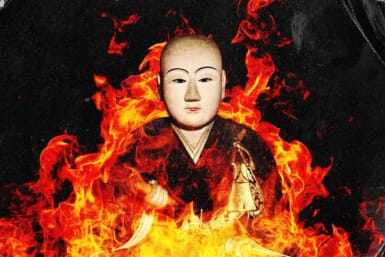When the Covid-19 pandemic started last year, one of the keywords bouncing around was 自粛 (jishuku; self-restraint). People were asked to refrain from going outside (外出自粛; gaishutsu jishuku) for the greater good. Though the roll-out of vaccines is moving forward in Japan, it seems prudent to continue with kokki-fukurei — the act of curbing one’s own desires for the sake of society at large.
Kokki-fukurei (克己復礼)
Meaning: exercising self-restraint and conforming to the rules of etiquette and society, self-control, abstention, self-discipline, curbing one’s own desires to obey rules and regulations.
Literal translation and kanji breakdown: Kokki-fukurei is a compound of two smaller idioms, 克己 (kokki; self-control) and 復礼 (fukurei; conforming to societal norms). If we break it down further to individual characters, we get 克 (koku; overcome), 己 (ki; self), 復 (fuku; restore, return to) and礼 (rei; manners). This can, in turn, be read as overcoming the self [in order to] return to [good] etiquette.
Kokki-fukurei: The Origins
This expression originally appears in The Analects (also known as The Analects of Confucius) a collection of Confucius teachings compiled by the philosopher’s students after his death. One of the stories in the book features a dialogue between Confucius and a student as they discuss ren, a virtue that reflects upon humanity and benevolence in society. It’s a positive quality that describes and encompasses a life driven by empathy for others.
“What is ren?” the student asks.
Confucius replies, “To restrain oneself and return to the rites.”
To paraphrase, it means overcoming one’s own desires and returning to politeness is the essence of humanity.
Fun fact: Confucius is called 孔子 (Koushi) or 孔夫子 (Koufushi) in Japanese.
Kokki-fukurei: Related Expressions
隠忍自重 Innin-jichou Behaving with patience and prudence, putting up with something
克己心 Kokkishin Spirit of self-denial
引っ込み思案 Hikkomi jian Reserved, introverted, withholding (generally negative meaning)
自制心 Jiseishin Self-control
無欲恬淡 Muyoku-tentan Indifferent to worldly gain
無欲無私 Muyoku-mushi Unselfish and impartial
勝は己に克より大なるはなし Katsu wa onore ni katsu yori dainaru wa nashi The best victory is conquering oneself (paraphrased from Plato)
私利私欲 Shiri-shiyoku (antonym) Desire to act only in one’s own self-interest, selfish desires
気随気儘 Kizui-kimama (antonym) As one pleases
我田引水 Gaden-insui (antonym) Drawing water for one’s own field, acting selfishly
傍若無人 Boujaku-bujin (antonym) Acting outrageously as if there were no one else around, arrogance, audacity
Using “kokki-fukurei” in a sentence
You’ll be much more likely to use the word 我慢 (gaman) in daily conversation if you’re talking about general self-restraint, but this is a handy expression when you want to emphasize the social aspect for your self-control.
歩きタバコをする人は、克己復礼の精神が欠けている。Aruki tabako wo suru hito wa, kokki-fukurei no seishin ga kaketeiru. People who smoke while walking lack the spirit of self-restraint.
利他の精神で、克己復礼を心がけよう。Rita no seishin de, kokki-fukurei wo kokorogakeyou. Try to be empathic/altruistic and do the right thing.
克己復礼を重んじる人物は、会社では重宝される。Kokki-fukurei wo omonjiru jinbutsu wa, kaisha de wa chouhou sareru. A person who respects self-restraint will be valued in a company.
Want more? Follow our weekly Yojijukugo Japanese Idiom series, published every Friday. Learn the meaning of “fuminfukyu” here, “jimonjitou” here and “yujufudan” here.








